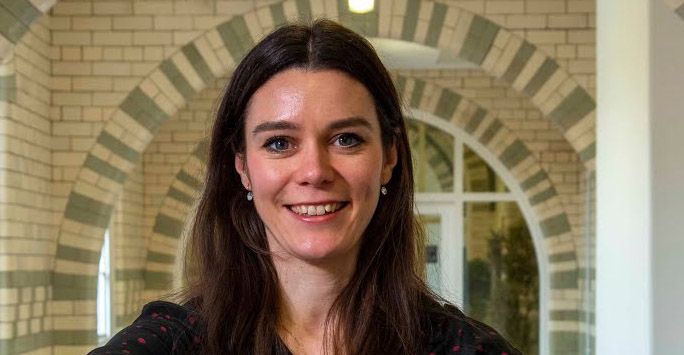Funding secured for dementia research in post COVID-19 era
ARC NWC Senior Research Fellow, Dr Clarissa Giebel, has secured funding from the pioneering Pandemic Institute in Liverpool for a new research project answering the question:“What are the long-term impacts and implications of the pandemic on accessing and using health and social care for dementia?”

Dr Giebel (above) is the Principal Lead on the initiative which is one of just eight diverse research projects, commissioned to assess the longer-term impact of the COVID-19 pandemic on UK and global health.
The backing for the research follows a funding boost to the Pandemic Institute of £225k, via a donation by leading UK insurer Aviva. The investment aims to build strong, sustainable, resilient communities that are better prepared for future crisis events on the scale of COVID-19.
The ARC NWC project will build on existing work carried out by Dr Giebel during the early stages of the 2020 pandemic which included the publishing of pioneering findings that explored how social support service use by older adults, carers and people living with dementia, and their mental well-being changed over the first three months after the pandemic outbreak. This is in addition to Dr Giebel spearheading findings of a UK survey of COVID-19 related social support closures and their effects on older people, people with dementia, and carers.
Dr Giebel said: “We will be re-contacting carers and people with dementia we spoke to at the very start of the pandemic, to hear first-hand how accessing health and social care services for dementia have changed, and how accessible and beneficial they are. We will complement this by recruiting carers and people with dementia from minority ethnic backgrounds to explore potentially additional barriers for people from more diverse backgrounds.”
All applications for the funding were reviewed by a panel of 27 experts, and Dr Giebel’s project will last 18 months. Public, carer and service user input was ingrained in the shaping of the bid and will continue until its completion.
Dr Giebel also outlined her target outcomes from the project:“We will produce recommendations for health and social care providers delivering dementia services, which will hopefully influence how those services are delivered.”
Dr Giebel is a member of the ARC NWC’s Health and Care across the Life Course theme and also chairs the Liverpool Dementia Ageing and Research Forum.
Professor Mark Gabbay, director of ARC NWC, said: “Securing this funding continues the excellent research work we are doing in the dementia field and which is becoming globally recognised. We also must ensure the research system in our own country and North West region is ready to tackle future pandemics and other pandemic-related health and social care challenges. The results of this research will be disseminated to our members in our region and further afield, thereby aiding the health and social care system as it recovers and reshapes post pandemic. It will also enable dementia services to become more resilient in the future.”
Professor Tom Solomon, director of The Pandemic Institute, said: “This research will help us take further steps forward in continuing to tackle COVID-19 and also to be better prepared for the future. The work we do from Liverpool has national and international impact and being able to further expand our research through these eight submissions will help keep us at the fore of the challenges around and solutions to COVID-19 and how best to recover from a pandemic.”
Many innovative research applications were received following the Institute’s funding call in September 2022, inviting project proposals from founding partner institutions including the University of Liverpool, Liverpool School of Tropical Medicine and Liverpool City Council.
The Pandemic Institute aims to build strong, sustainable, resilient communities that are better prepared for future crisis events on the scale of COVID-19 pandemic.